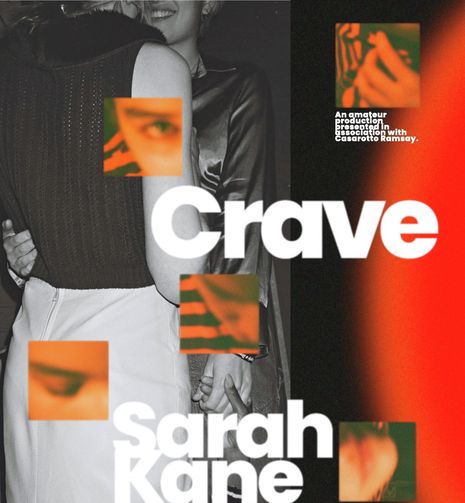Crave Preview
Stanley Lawson interviews Jack Ward, the director of a new production of Sarah Kane’s Crave

Sarah Kane’s Crave is arguably the easiest to stage and easiest to watch of all the celebrated and controversial playwright’s works. So says Jack Ward, the director of a new production of the play at the Corpus Playroom which runs next week. Even if that’s true it’s a low bar; Kane’s plays are famously challenging viewing. When I ask Ward why she chose to pitch the play for this term’s ADC/Corpus programme, she responds that she is compelled by the world of the play, which Kane has written to be deeply invested in interpersonal relationships, how they are formed and how we process them.
Within that framework, Ward suggests that Kane is a perversely moral playwright, contrary to initial reception of her more infamously violent early plays in the 1990s as revelling in the post-modern death of morality. What makes Kane, and Crave (a shorter and much less physically violent play), more than that reputation is the careful way in which the characters are offered a gesture of a ‘line of flight’, at least partially, from the misery of the space of the play by the end.
Crave, at least as Ward sees it, is a simultaneously moral and anti-didactic play which limits the cruelty – of which there is plenty – to the confines of the stage; in other words, the cruelty does not necessarily continue. Though she is cautious about drawing a line between ‘real’ life and what happens on stage, some distinction between the space in which the characters suffer and the other non-theatrical world beyond is part of what Kane was doing when she wrote Crave. Given the challenging content, the division between the rehearsal room and life outside has been crucial for the wellbeing of the directorial team and the cast.
In terms of bringing the play to the Corpus space, the play is of course relentless, and Ward thinks this production leans into that – using Talulah Thomas’s score in lieu of a set to gesture to where the characters are. The four characters, each assigned a letter by Kane instead of a name (C, M, B and A), don’t physically interact in most productions of the play but Ward and the assistant directors (Elizabeth Laurence and Ilona Sell) were keen to make a break with the tradition of treating Kane’s characters as voices reading text.
“The approach to the gender of the characters will be radically different to most productions of Crave”
The hope is that in this production, each character will be humanised in their physical interaction with one another. Ward notes slightly ruefully she has realised why so many productions keep the characters in semi-static positions; in an already incredibly unwieldy script which resembles poetry more than a traditional play, introducing a large amount of movement adds yet another potentially unwieldy element. This has not deterred Ward – whose background is in contemporary dance and is interested in physical contact and touch in theatre – and the cast, who have embraced the exploration of proximity and physical intimacy during the rehearsal process.
That is not the only new perspective that this production brings to the play: with both director and multiple members of the cast identifying as trans or otherwise gender non-conforming, the approach to the gender of the characters will be radically different to most productions of Crave.
Ward doesn’t want to give everything they’ve done away before people see the show, but mentions the character ‘M’ (who will be played by Charli Cowgill) as immediately jumping out during initial readings as a site for trans reinterpretation in the play. This new dimension is in a way part of the project of humanising the characters, by adding layers of interpretation to character’s subjectivities and carrying through the unsettled and open nature of the play through to the gender of the characters.
“The cast have embraced the exploration of proximity and physical intimacy during the rehearsal process”
Ward stressed that the cruelty and darkness of the play will run through the relationships between these characters. Within a t4t relationship (trans for trans, a common descriptor within the trans community when two trans people are in a relationship) and other queer relationships, Ward is keen to stage the dark and the messy aspects of queer love, an often under-explored experience in theatre but, she argues, a vital one in affording trans and other queer subjectivities a full humanity on stage.
My final question about what may have emerged out of the process of working on the play that Ward would share with an audience before they see this production takes her back to the opening question of the interview ’why Crave?’. She confesses that Crave appeals to directors, writers and actors generally because it is incredibly challenging and difficult to stage. Crave certainly will be challenging for both audience and the cast, but with the new perspectives of this production and Kane’s brilliant script, it promises to be a deeply compelling experience.
Crave will be playing at 9:30pm from Tuesday 8th March - Sat 12th March at the Corpus Playroom.
 News / SU reluctantly registers controversial women’s soc18 December 2025
News / SU reluctantly registers controversial women’s soc18 December 2025 News / CUP announces funding scheme for under-represented academics19 December 2025
News / CUP announces funding scheme for under-represented academics19 December 2025 Features / Should I stay or should I go? Cambridge students and alumni reflect on how their memories stay with them15 December 2025
Features / Should I stay or should I go? Cambridge students and alumni reflect on how their memories stay with them15 December 2025 Fashion / The art of the formal outfit 18 December 2025
Fashion / The art of the formal outfit 18 December 2025 Lifestyle / Summer lovin’ had me so… lonely?18 December 2025
Lifestyle / Summer lovin’ had me so… lonely?18 December 2025









